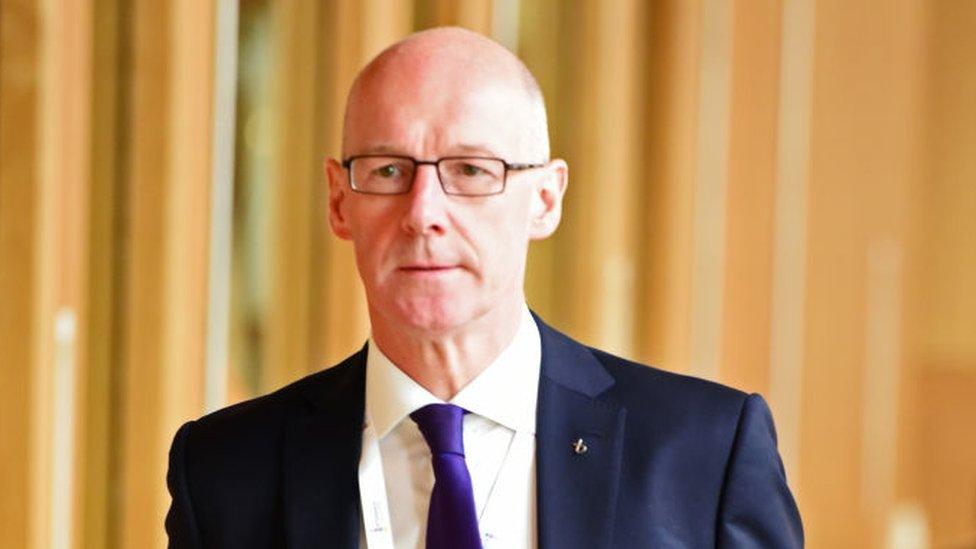Scotland's deputy first minister John Swinney to stand down
- Published
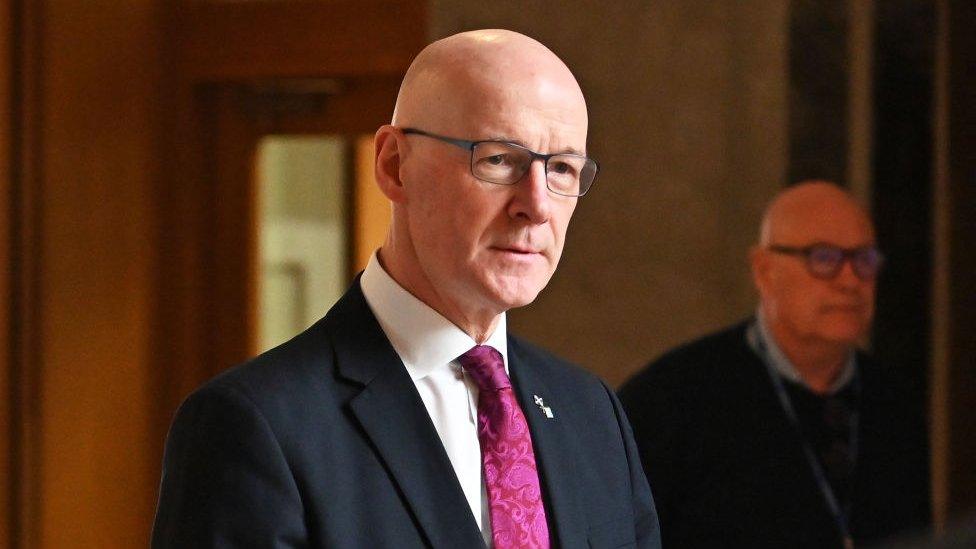
John Swinney has been deputy first minister since 2014
Deputy First Minister John Swinney has announced he is leaving the Scottish government after almost 16 years.
The 58-year-old has been Nicola Sturgeon's deputy since she became first minister in 2014.
Mr Swinney will stand down once a new first minister is appointed later this month.
In a letter to Ms Sturgeon, who announced her own departure last month, Mr Swinney said it had been an "honour to serve Scotland".
Mr Swinney has been an SNP MSP since the beginning of the Scottish Parliament in 1999.
He was leader of the party for four years from 2000 to 2004 and has held cabinet roles including education secretary and finance secretary as well as serving as the country's deputy first minister since 2014.
Ms Sturgeon paid tribute to Mr Swinney's "deep care and attention to the wellbeing of our nation" and said she could not have wished for a better "partner in government".
When Ms Sturgeon announced she was stepping down, Mr Swinney ruled himself out of the running to replace her, saying he wished to "create the space" for "fresh perspective" within the SNP.
He has so far not publicly backed any of the three contenders - Ash Regan, Kate Forbes and Humza Yousaf - in the contest, despite speculation he could endorse Mr Yousaf.
However, when Ms Forbes said she would not have voted for gay marriage if she had been an MSP at the time, Mr Swinney intervened to say he profoundly disagreed with her despite having "deep religious faith" himself.
He questioned whether it would be appropriate for someone with her views to be SNP leader.
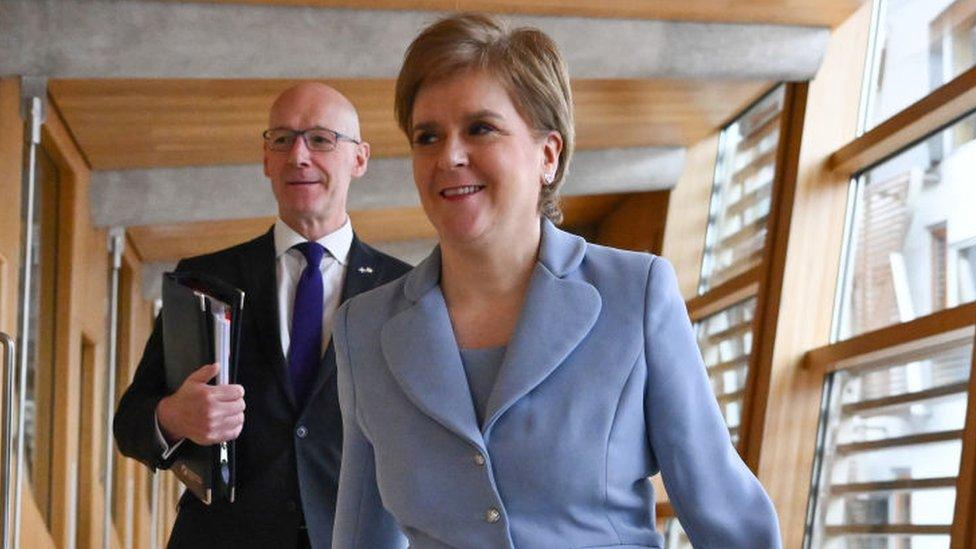
Mr Swinney has been Nicola Sturgeon's deputy for more than eight years
Mr Swinney was born in Edinburgh and has been an SNP stalwart for decades, having joined the party at the age of 15.
By the time he was 22 he was national secretary, and served in a series of increasingly senior roles before winning the North Tayside seat at Westminster in 1997.
Two years later he headed to Holyrood, and allowing for some boundary tweaks has represented the same patch of Perthshire ever since - one of only three MSPs with continuous service of one constituency since 1999.
Mr Swinney's rise through the ranks of the SNP was complete in 2000, when he was elected leader following the (first) departure of Alex Salmond.
However, his leadership was not a great success for the party and he stood down, saying that the SNP was "not yet seen as an alternative government in waiting".
Three years later Alex Salmond took the SNP into power in Scotland and Mr Swinney was handed a key role as finance secretary.
He kept that role when Nicola Sturgeon became first minister after the 2014 independence referendum defeat, as well as becoming deputy first minister.
After the 2016 election Ms Sturgeon reshuffled her team, moving Mr Swinney to education.
In 2021, he became Cabinet Secretary for Covid Recovery.
In his resignation letter, Mr Swinney said it had been the privilege of his life to serve in the Scottish Government since 2007.
Ms Sturgeon replied: "Your contribution to our nation, almost 16 years in government is considerable, indeed unique.
"Therefore, while I - perhaps more than most - completely understand your decision, I still felt a real sense of sadness when you told me of it."


John Swinney's departure from the front benches was perhaps not unexpected, after he decided against running for the leadership himself.
But his presence will be sorely missed by whoever gets the job, given his deep knowledge of parliament and government.
Just between John Swinney and Nicola Sturgeon, the SNP will have almost 50 years of front-line experience sitting on the backbenches.
Perhaps old instincts will kick in and the pair will engage in intense competition for the deputy convenership of the local government committee.
But they will both be keen not to cast a shadow over the new administration - which will be staffed by much fresher, and thus less experienced, faces.

Scottish Conservative deputy leader Meghan Gallacher said Mr Swinney had jumped before he was pushed.
She said: "He knows that a new first minister will mean a reshuffle, which would have led to his sacking.
"The fact that the deputy first minister, one of the SNP's most senior figures, felt he had to resign before he was sacked shows how bitter and divided the leadership contest has made this Nationalist government."
Meanwhile, the Scottish Greens thanked Mr Swinney for his "friendship, fortitude and fairness".
Related topics
- Published15 February 2023

- Published22 February 2023
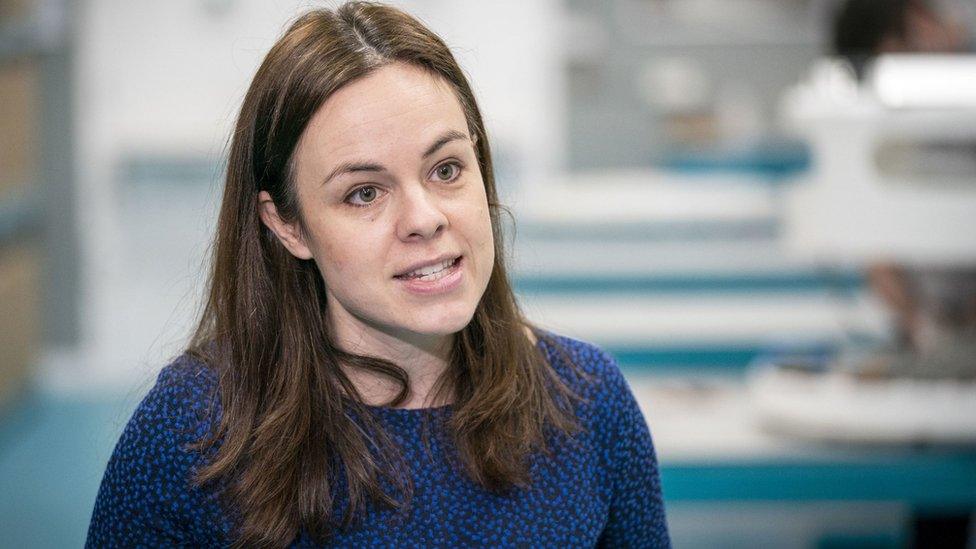
- Published2 March 2023
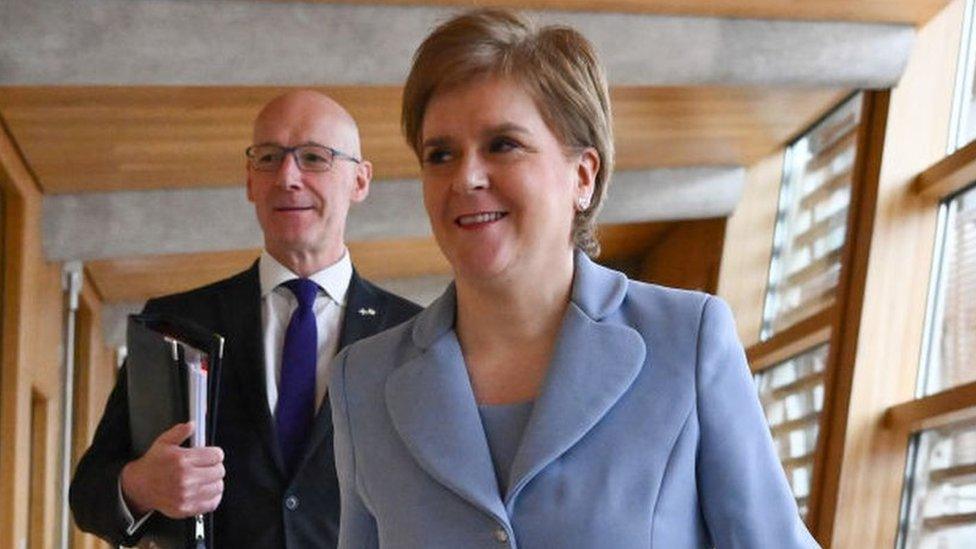
- Published17 February 2023
